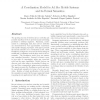Free Online Productivity Tools
i2Speak
i2Symbol
i2OCR
iTex2Img
iWeb2Print
iWeb2Shot
i2Type
iPdf2Split
iPdf2Merge
i2Bopomofo
i2Arabic
i2Style
i2Image
i2PDF
iLatex2Rtf
Sci2ools
152
Voted
EUROPAR
2003
Springer
2003
Springer
A Coordination Model for ad hoc Mobile Systems
The growing success of wireless ad hoc networks and portable hardware devices presents many interesting problems to software engineers. Particular, coordination is a challenging task, since ad hoc networks are characterized by very opportunistic connections and rapidly changing topologies. This paper presents the formal semantics of a coordination model, called PeerSpaces, designed to overcome the shortcomings of traditional coordination models when used in ad hoc networks. The PeerSpaces model does not assume any centralized structure. Instead, it fosters a peer to peer style of computation, where any connected node has the same capabilities. Mobile devices can discover each other using a decentralized lookup service and then communicate using remote primitives. The paper presents the PeerSpaces model and gives its operational semantics in terms of a process calculus. Besides a formal specification of the model, the semantics presented in the paper supports formal reasoning about ap...
Related Content
| Added | 06 Jul 2010 |
| Updated | 06 Jul 2010 |
| Type | Conference |
| Year | 2003 |
| Where | EUROPAR |
| Authors | Marco Tulio de Oliveira Valente, Fernando Magno Quintão Pereira, Roberto da Silva Bigonha, Mariza Andrade da Silva Bigonha |
Comments (0)

